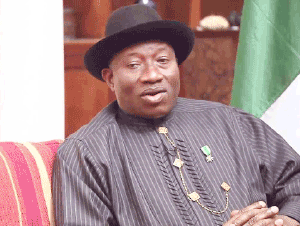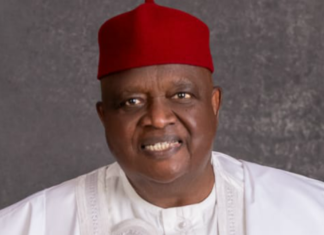There are ample red light in the way supporters of the presidential contenders are comporting themselves, writes Senior Correspondent, ISHAYA IBRAHIM
Goodluck Jonathan, presidential candidate of the Peoples Democratic Party (PDP), and Muhammadu Buhari of All Progressives Congress (APC), last Wednesday, signed an accord to halt pockets of violence preceding the general elections.
In the accord signed before former Secretary-General of the United Nations, Kofi Annan; former Secretary-General of the Commonwealth, Emeka Anyaoku, among others, presidential candidates of the parties also pledged to refrain from campaigns that could involve religious incitement, ethnic or tribal profiling and to get their agents to toe similar line.
They also agreed “to refrain from making, or causing to make statements, pronouncements, declarations or speeches that have the capacity to incite any form of violence, before, during and after the elections”.
Other presidential candidates present at the ceremony included Tunde Kelani of Action Alliance (AA), Rafiu Salau of Alliance for Democracy (AD), Ganiyu Galadima of Alliance Congress (AC), Mani Ahmad of African Democratic Congress (ADC), Sam Eke of Citizens Popular Party (CPP), Ambrose Oworu of Hope Party (HP), Prof. Oluremi Sonaiya of KOWA Party (KP) and Chekwas Okorie of Unity Progressive Party (UPP).
Root of election-induced violence
Jonathan had, at the occasion, observed that, contrary to the belief that past incidence of violence were as a result of electoral malpractices, there were other factors involved. Politicians, he said, in some cases made provocative statements and whip up unnecessary sentiments and instigate violence as soon as they notice that they have lost an election.
The president also fingered religious and traditional leaders who preach the hate message, instigating their followers to be confrontational and sometimes by labelling some candidates as the enemies.
Buhari, in his presentation, noted that much of the crises associated with the conduct of election and its outcome had to do with a flawed process and inability to secure justice by the affected persons. He cited several examples of frustrations he had gone through in an effort to protest what was believed to be flawed electoral processes and results, including his experiences at the courts.
Annan, who was the special guest of honour, while presenting the keynote address, urged the aspirants to avoid inflammatory statements, as the elections present an opportunity for the country to prove itself before the international community.
Living in fear
Until the Wednesday intervention, there had been concerns that exchanges from the camps of the APC and PDP may soon get to the boil. The apprehension had been on the likely impact of the troubling situation, especially if not properly handled. Those who reasoned along this line had recalled that election-induced violence had accounted largely for collapse of previous civilian administrations in the country.
In the First Republic, reckless utterances, abuse of state security, sectional rivalries, similar to what have been playing out now, contributed to the end of the government of Tafawa Balewa.
In 2015, these traits are showing up. Acts of violence have been reported in some parts of the country, notably in Rivers State, where killings and counter-killings are said to be taking place between supporters of the PDP and APC.
Other states are not exempted from the rising culture of intolerance. On January 10, for instance, PDP supporters had converged at the Hiapang Airport, Jos, Plateau State, to receive Gyang Pwajok, the gubernatorial candidate of the party. While that was going on, elsewhere in the metropolis, some youths were setting the campaign vehicles of President Jonathan on fire.
In Kaduna, the political atmosphere is already tensed, with reports indicating that non-indigenes, especially Southerners, are getting set to leave the state en masse, to avoid what might be a repeat of the 2011 post-election violence.
A number of them had avoided travelling for the yuletide, since the election was just weeks away, the perfect time they plan to leave the state.
Our reporter learnt that though churches have been prevailing on such apprehensive members to remain steadfast and pray, rather than leave the state in droves, the exhortations seem not to be having much impact. For instance, Christopher Okafor, a trader in Kaduna, said he would leave the state in the first week of February, to avoid being caught in what he suspects would be a tumultuous election crisis.
There is also the disturbing news that Jonathan campaign committee in Kaduna State could not find drivers to chauffeur his campaign vehicles because of fear that they could be attacked by opponents of the president.
TheNiche had reported that even for the sum of N70,000 pay (in the face of economic crunch), such drivers had refused to work for the president’s re-election, for fear of being attacked by those opposed to his second term.
Sources in the state said hundreds of the branded vehicles bearing Jonathan’s pictures have been lying in the compound of the Government House.
PDP Publicity Secretary in the state, Ibrahim Mansur, however, put a lie to the insinuation that the president’s campaign vehicles were being deserted by drivers.
“A campaign coordinator was just appointed, that is Husseini Jalo. There are also campaign coordinators at the local government level. They are the ones that would take possession of the vehicles in the coming days. So, the story that nobody wanted to work for the president’s re-election in the North is propaganda by the opposition who are jittery that Goodluck Jonathan will win,” he said.
The concern by many is that Kaduna is a potential flashpoint for election violence, given the state’s penchant for voting along religious lines. In 2011, an estimated 2,000 people were killed in a violence that took religious dimension following the victory of Jonathan (a Christian) against Buhari (a Muslim).
There are fears that in 2015, the violence could be replicated if the election process is not handled well.
For instance, neighborhoods dominated by Muslims are firmly against the candidacy of Jonathan. Campaigning for him by a fellow Muslim could be perceived as betrayal and met with violence.
In Kawo, an area in the state, a man who was pasting Jonathan’s campaign posters on a bridge, was allegedly assaulted, sources said. Similar incidents have also been reported in Zaria, Tudun Wada, Rigasa and other volatile areas in the state.
The opposition against the president among Muslim voters in the North is borne out of the perception that he uses the church to campaign for his re-election, creating the impression that he is a Christian president.
“Whether Goodluck likes to hear it or not, he is seen by most Muslim masses in Nigeria as the most pro-Christian president,” Ahmad Gumi, a controversial Muslim cleric, wrote in an open letter to the president.
Even Gumi has not been spared. In October, a worshipper charged at him during a sermon in which he counselled Buhari to drop his presidential ambition. Mosque security managed to whisk the troublemaker away.
In the 2015 election, if there will be any trouble, it is unlikely to take religious tone, since Buhari, unlike in 2011, now has broad-base support along religious and regional lines. So the trouble could be between PDP and APC supporters, analysts have argued.
Elsewhere, the governor of Kano State, Rabiu Kwankwaso, had remarked that members of the PDP in the North were terrified to promote the president for fear of being attacked due to his failure to deliver the dividends of democracy.
Watching the watchdog
Another worry in the election is the conduct of the State Security Services (SSS) which seems to have become partisan.
On November 24, it broke into APC’s office in Lagos, on the suspicion that the party was planning to hack and manipulate the database of the Independent National Electoral Commission (INEC).
Information communication experts have since faulted the SSS, saying that “one cannot hack what is not online, and the INEC database is offline”. But the Service insists that it has its facts.
Those who are not convinced of its explanation, however, argue that the conduct of the SSS shows it is partisan, a reminder of how the late Premier of the Western Region, Samuel Akintola, in league with his allies: the Sardauna of Sokoto and leader of the Northern Peoples Congress (NPC), Ahmadu Bello, and leader of the government, Tafawa Balewa, used military might against opponents, a move that later boomeranged.
At the mercy of Boko Haram
While politicians are spitting fire, there is also Boko Haram to deal with. On January 14, the U.S. State Department revealed that the sect’s attacks would increase because of the coming election.
Spokeswoman, Marie Harf, said, however, that the February 14 presidential election should go ahead despite the violence which has forced about 20,000 Nigerians to flee to neighbouring countries in recent weeks.
“There has been a sharp escalation in the number of reported casualties. We do believe the election is a factor. Boko Haram has tended to, particularly around something like an election, use political issues or sensitivities to try to inflame tension. We have seen that as one of its tactics, and that is why it is so important to move forward with the election, because we believe it is important,” she noted.
The Washington Post, a well-respected newspaper in the U.S., counselled Nigeria on how to avoid violence during and after the polls.
“To minimise the risk of post-election violence, the Nigerian government must first do more to support its electoral commission; there have been serious doubts about its readiness to organise the registration and voting process. Less than six weeks ahead of elections, the federal government is yet to approve the commission’s budget. Millions of permanent voting cards (PVCs) have not yet been distributed.
“Jonathan should also avoid misusing military and police forces before, during and after the election. The Nigerian army, which was in power from 1966 to 1999, still holds a massive amount of influence over political affairs and has been accused of abuses in past elections. State security forces must protect human life and security first and foremost and cannot be used as a tool of the incumbent party.
“The United States and other Western governments ought to press Jonathan as well as his opponent to respect the rule of law. The government must prioritise peace, not power, if Nigeria is to weather this particularly dangerous stress test,” it said.












